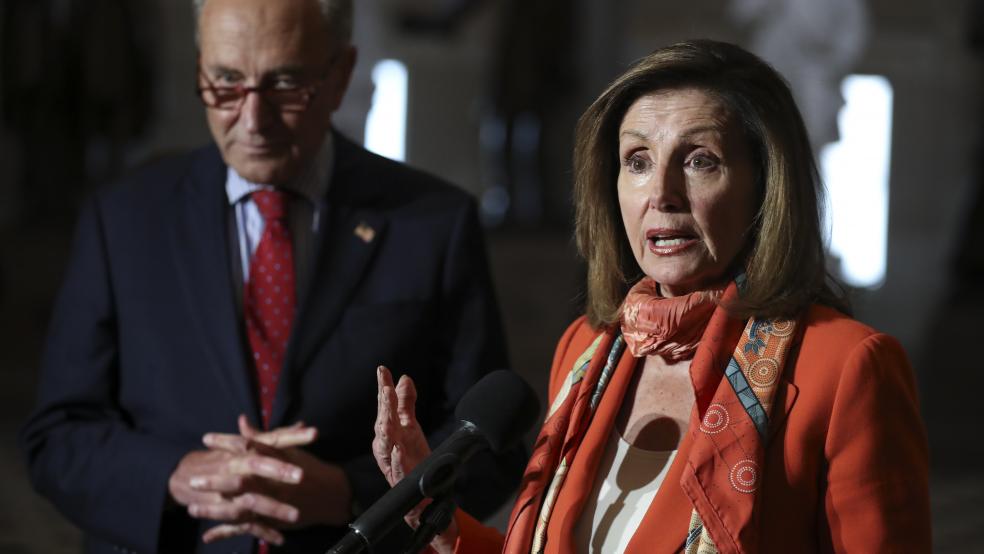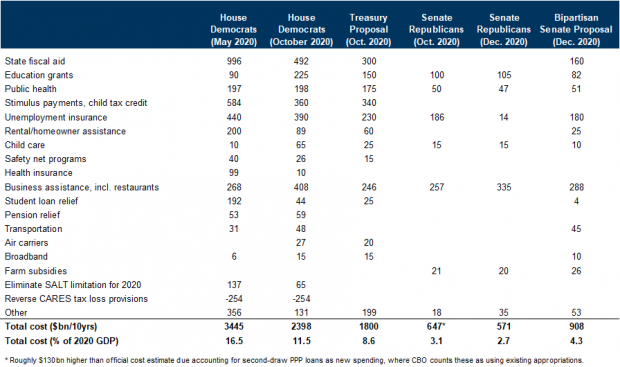Coronavirus stimulus discussions saw some dramatic movement on Wednesday, but it’s not clear yet whether that will translate to real progress toward a deal.
House Speaker Nancy Pelosi (D-CA) and Senate Democratic Leader Chuck Schumer (D-NY) called on Senate Majority Leader Mitch McConnell (R-KY) to negotiate a new coronavirus relief package, using the $908 billion bipartisan stimulus plan proposed by centrist lawmakers on Tuesday as the starting point for talks. President-elect Joe Biden also endorsed the bipartisan proposal, saying it would be a “down payment” on larger bill to come once he takes office.
Pelosi and Schumer have previously pressed for a package of roughly $2.2 trillion and they reportedly offered up a $1.3 trillion plan in private on Monday. But in a joint statement released Wednesday, they embraced the narrower bipartisan proposal as a basis for compromise.
“While we made a new offer to Leader McConnell and [House Minority] Leader McCarthy on Monday, in the spirit of compromise we believe the bipartisan framework introduced by Senators yesterday should be used as the basis for immediate bipartisan, bicameral negotiations,” they said. “Of course, we and others will offer improvements, but the need to act is immediate and we believe that with good-faith negotiations we could come to an agreement.”
Why it matters: “Wednesday’s announcement by Pelosi and Schumer appeared to be the first time that leaders from one party agreed to back a proposal that had substantial support of members of the other party,” The Washington Post said. “And the willingness to accept a potential bill totaling less than $1 trillion represents a significant step-down for the top Democrats, who had pushed for more than $3 trillion in new aid earlier this year.”
McConnell also noted the movement by Democrats. “In the last several days, the Democrats’ leaders have signaled a new willingness to engage in good faith," he said on the Senate floor, according to Roll Call.
Where a stimulus deal stands: McConnell rejected the bipartisan plan after it was announced Tuesday. He reportedly circulated a revised, smaller proposal that he described as a stopgap measure, one that he and Treasury Secretary Steven Mnuchin said has the support of President Trump. (Before November’s elections, the president had called for a much larger package and his negotiators had offered up some $1.9 trillion, but congressional Republicans objected to a stimulus that size.)
“After the first of the year, there is likely to be a discussion about some additional package of some size next year, depending upon what the new administration wants to pursue,” McConnell said.
Biden said Tuesday that any relief package passed in the current lame-duck session of Congress would be “at best just a start.” But Democrats had previously blocked a $500 billion GOP plan similar to McConnell’s latest blueprint, calling it grossly inadequate, and they panned the revised version.
McConnell’s latest plan reportedly includes $333 billion in aid for businesses along with money for schools, vaccines and agriculture. It would also make business meals and entertainment expenses 100% tax deductible and provide a liability shield for businesses against coronavirus-related lawsuits, a provision that Democrats have rejected. But the plan does not include the $300 in supplemental unemployment benefits that were in an earlier GOP proposal and does not provide the additional aid to state and local governments that Democrats have demanded. See the chart below from Goldman Sachs for a comparison of the various plans that have come out since May.
What’s at stake: S&P Global Chief Economist Beth Ann Bovino warned Wednesday that the economy could fall into recession again and take almost a year longer to recover if Congress doesn’t pass a new stimulus bill.
The bottom line: Time is running out, as lawmakers aim to have their legislative business done by December 11 – and lots of issues remain to be addressed, both on Covid relief and a $1.4 trillion annual spending package that’s likely to be the vehicle for any pandemic aid. The deadline could still change via a short-term government funding bill that buys a bit more time.
Budget
Pelosi and Schumer Make a Big Concession on Stimulus

Sipa USA





